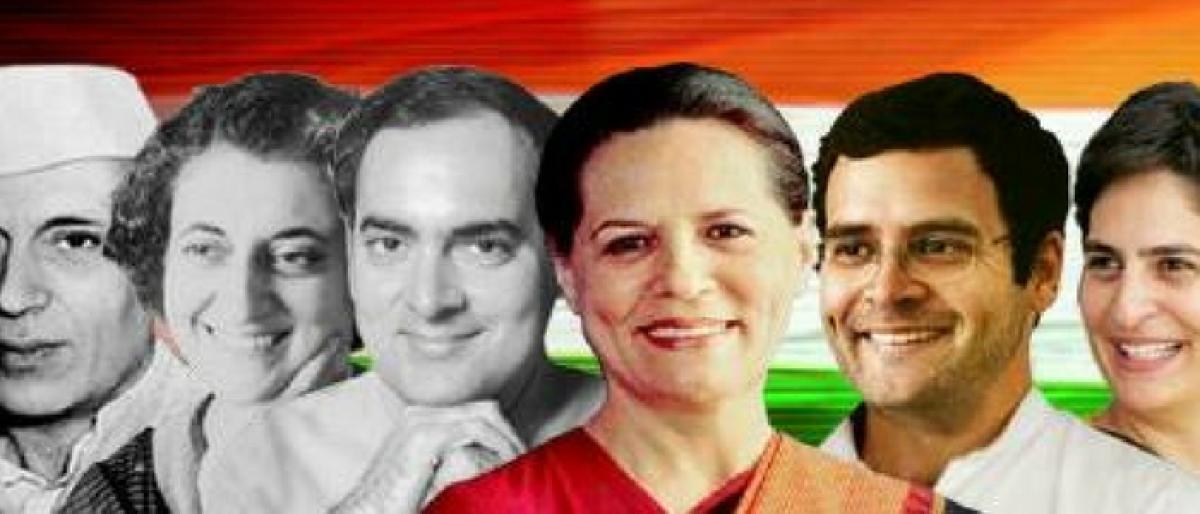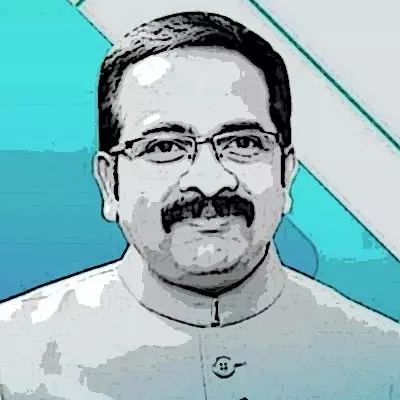Live
- Call to inculcate habit of reading books
- 63% parents give milk to their kids to maintain intake of calcium
- Maoist Leader Manjula Surrenders in Warangal, Receives ₹20 Lakh Reward
- Kartika Purnima celebrations fervour marks Telugu States, devotees flock to shiva shrines
- YSRCP alleges meagre fund allocations for Super Six schemes
- Telangana CM Reviews Plans for First Anniversary of State Government
- Vijayawada: Kindness Day celebrated
- Rajamahendravaram: Students advised to set clear goals
- Digital locker facility now available at Namma Metro stations
- Swarna Vaijayanthi Mala presented to Tirumala god
Just In

Congress is a failed family business. There are many studies in the area of family managed businesses and their progression, which clearly indicate that family businesses weaken at every generation and eventually fail around the third generation onwards to disappear by the fifth generation, if critical strategic interventions are not effected. Politics in a democracy is not a business, and certain
Congress is a failed family business. There are many studies in the area of family managed businesses and their progression, which clearly indicate that family businesses weaken at every generation and eventually fail around the third generation onwards to disappear by the fifth generation, if critical strategic interventions are not effected. Politics in a democracy is not a business, and certainly cannot be a family business. However, Congress party built its entire political organisation like a family owned and managed business entity against all fundamental principles of democracy.
I am pushed to call Congress party a family owned and managed corporate business entity, as it has all the necessary hues. Congress party has always put Nehru family above its own and even above the nation’s interests. This pattern is evident on multiple occasions in its six-decade rule of India. It always worked with profit as a prime motive and family progression as its core ideology. In my objective assessment, Congress did not have India’s interests aligned to that motive, as much as it had personal, political and family interests rooted in its organisational objectives.
It’s a shame that Indian voters allowed this illegitimate family business with self-serving agenda to flourish and rule this nation for six decades. Only since 2014, the voters of India have started teaching Congress party lessons in democracy through their votes, in elections across India. This treatment was long due for Congress party. However, it’s better late than never.
Over 90 per cent of businesses in the world are either family owned, family run or both. Family businesses constitute small, medium, large and even listed companies. The corporate cycle of success and failure hugely depends on the decisions these companies make in their management and ownership orientation. Studies indicate that massive successes in family businesses can be attributed to professionalising their organisations by withdrawing family from key executive positions across board. In the same breath, studies attribute dismal failures to family members being in management positions across board, especially in key executive positions.
If one studies Congress party as an organisation, the aforementioned theory is applicable to project its trajectory. The fundamental reasons for success and failures of family businesses globally have been studied systematically for decades and the outcomes of these studies are scientific and objective. The theories of family managed businesses are time-tested and backed up with hard facts.
By design, Congress party since its rebirth as a political entity in 1947 continued as a family dynasty under the leadership of Jawaharlal Nehru. In fact, Nehru was never shy of exhibiting his dynastic mindset even during the first term as the Prime Minister of India; there are many historic instances of his pre-independent and post-independent politics of oppression and subversion of non-family members in Congress party.
While there are many historic instances, the popular victims of Congress party dynastic system in the pre-independent era are Netaji Subas Chandra Bose and many prominent freedom fighters. In the post independent era, Lal Bahadur Shastri, Sardar Vallabhbhai Patel, Kamraj, Yaswant Rao Chauhan, T T Krishnamachari, Guljarilal Nanda, Nijalingappa, Morarji Desai and many other stalwarts were belittled, subdued and their contributions to India were systematically undermined in mainstream political ecosystem and even in the history text books.
To thicken the plot further, there are many mysterious deaths too in this family power saga. While Netaji’s death tops the list, Lal Bahadur Shastri’s death is a mystery too. So are the sudden deaths of much younger Rajesh Pilot and Madhav Rao Scindia. The history of Congress is sprayed with such incidents which shroud in secrecy and mystery, leading to a loud suggestion that all is permissible to ensure continuity of power for family members in the party and in government.
After seven long decades, the dynasty is failing, and so is the family business Congress party has been running for four generations. The theory of FMB’s is alive in the case study of Congress party’s natural extinction in progress. The recent time line clearly indicates that revival of this party is close to impossible as there’s no family member in succession who can regain the lost credibility of this political entity, in the minds of Indian voters and even in its own party leaders.
Family businesses which depend on blood line for succession cease to thrive and sometimes even survive beyond a point. Especially, when the successors lack will, open mind, competence, diligence and respect. Both the crown prince Rahul Gandhi and prospective princess Priyanka Gandhi lack all these factors, which are required to reignite the flickering political fortunes of Congress party. Professionalising an organisation with competent, skilled, motivated and visionary leaders is the key for continuity and success.
Family businesses which thrive for generations going past the redlines drawn by FMB theories are, the ones which adapt to changing ecosystem, restructure regularly, avoid family red tape in executive positions, avoid weak partitions, nurture professionalism and permeate the core values and ideology to the last man in the system. BJP is a classic example of 100 per cent professionally managed organisation.
There’s no professional organisation like BJP in the entire political ecosystem of India. It has no family baggage and blood line liability. BJP is grounded to its core ideology of nation first and integral humanism. It understands the basic function of a leader is to produce more leaders. Each of the leaders in the organisation over the last four decades has produced taller leaders than themselves. A professionally owned and managed organisation reinvents and rejuvenates itself effectively and regularly than one laden with dynastic and family burden.
Classic examples in BJP are right on top of the pyramid for everyone to see, not a single leader across the spectrum of BJP organisation has risen through a sycophantic process of being subservient to an individual, a family or a dynasty. In a sharp and visible contrast to BJP, almost all the leaders at the helm of Congress organisation today have risen purely due to their unqualified loyalties to the first family and their unwavering surrender to the individuals in that family, which is an enduring sycophantic model adopted by the Congress party.
Continuity of dynasty comes with a cost and the fourth generation Congress scions are experiencing it. Like in all failing or failed family managed business, the successors end up inheriting liabilities, criticism, insult, pain and distress. This is the inescapable downside of a family owned and family run business. The good times last only as long as they are successful.
Once the failure cycle hits it, unless a huge restructuring process, which involves professionalising every layer of the organisation, is effected under a strong, respected leader, the revival is impossible. Many regional parties, which are subsidiary family businesses with similar models like Congress across India, need to learn a lesson or two from the natural destiny of these kinds of organisations. In my conclusive analysis, Congress is failing at a speed that it cannot revive itself. This organisation cannot be repaired or restructured, as it has passed that extraction stage almost 5 years ago.
Congress has outlived its dynastic purpose and survived beyond its natural timeline. Those who still nurture hopes of revival of this crumbling family business, lack basic understanding of critical factors which impact organisations rise and fall.

© 2024 Hyderabad Media House Limited/The Hans India. All rights reserved. Powered by hocalwire.com







